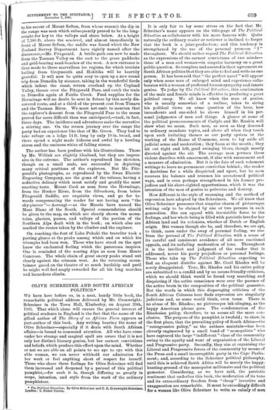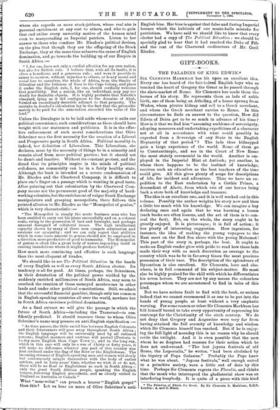OLIVE SCHREINER AND SOUTH AFRICAN POLITICS.*
WE have here before us, in a neat, handy little book, the remarkable political address delivered by Mr. Cronwright- Schreiner in the Town Hall, Kimberley, on August 20th, 1895. That which alone will ensure the general interest of political students in England is the fact that the name of the gifted author of The Story of an African Farm appears as part-author of this book. Any writing bearing the name of Olive Schreiner—especially if it deals with South African affairs—is bound to command attention. All who have come under her strange and magical spell are aware that it is not only her distinct literary genius, but her earnest convictions and beliefs, which produce this effect upon the mind. Whether or not we are able on all points to see eye to eye with this able woman, we can never withhold our admiration for her work or feel anything short of respect for herself. Those who share these feelings for Olive Schreiner will find them increased and deepened by a perusal of this political pamphlet,—for such it is, though differing so greatly in scope, intention, and style from the work of the ordinary pamphleteer.
• The Political Situation. By Olive Schreiner and C. S. Oronwright4obreiner. Undon: T. rusher Unwin.
It is only fair to lay some stress on the fact that Mr. Schreiner's name appears on the title-page of The Political Situation as collaborator with his more famous wife. Quite naturally the ordinary reader or reviewer is inclined to forget that the book is a joint-production ; and this tendency is strengthened by the use of the personal pronoun " I" throughout. We should rather regard The Political Situation as the expressions of the earnest convictions of two minds— those of a man and woman—in singular harmony on a great public question. So complete and assured is their agreement on South African politics that they are able to feel and write as one person. It has been said that" the perfect novel "will appear only when some man of enlarged mind and experience colla- borates with a woman of profound human sympathy and innate genius. To judge by The Political Situation, this combination of the male and female minds is effective in producing a great political essay. We all know when the man of genius, who is usually somewhat of a recluse, takes to airing his political views on some question of the hour, how immoderate and one-sided he shows himself in his per- sonal judgments of men and things. A glance at some of the political pronouncements of Carlyle and Mr. Ruskin will show what we mean. Such men, as soon as they descend to ordinary mundane topics, and above all when they touch upon such irritating themes as our party system or the working of the House of Commons, seem to lay aside all judicial sense and moderation ; they foam at the mouth ; they hit out right and left, good swinging blows, though mostly directed against the air. The average man peruses these violent diatribes with amazement, if also with amusement and a measure of admiration. But it is the fate of such vehement writings to leave no permanent conviction behind ; the reader is doubtless for a while disquieted and upset, but he soon recovers his balance and resumes his accustomed political ways, and is even perhaps strengthened in his former pre- judices and his short-sighted opportunisms, which it was the intention of the man of genius to pulverise and destroy.
How different is the style of reasoning and the method of expression here adopted by the Schreiners. We all know that Olive Schreiner possesses that singular charm of picturesque writing only to be claimed by one or two persons in each generation. She can appeal with irresistible force to the feelings, and her whole being is filled with patriotic love for her African land and its colonists, whether of Dutch or English origin. But woman though she be, and therefore, we are apt, to think, more under the sway of personal feeling, we rise from the perusal of The Political Situation with a sense of its careful and consistent avoidance of all mere emotional appeals, and its unfailing moderation of tone. Throughout it is the intellect and judgment of the reader that is addressed, never his party prejudices or personal feelings. Those who take up The Political Situation expecting to find an eloquent diatribe against Mr. Cecil Rhodes will be sorely disappointed. True, Mr. Rhodes and his entire policy are submitted to a candid and by no means friendly criticism, which we should think would be found very searching and disquieting if the active conscience were ever the partner of the active brain in the composition of the political gamester. But the words in which this disparaging criticism of the South African Colossus here finds expression are singularly judicious and, as some would think, even tame. There is no abuse of Mr. Rhodes ; no picturesque ink-slinging, as the happy American phrase goes. The condemnation of the Rhodesian policy, therefore, to us seems all the more con- clusive. The purpose of the pamphlet is twofold ; to show, in the first place, that the prevailing policy of South Africa—the "retrogressive policy," as the authors maintain—has been cleverly engineered by a small band of " monopolists " who have captured the large "indifferent" class of the community owing to the apathy and want of organisation of the Liberal and Progressive party. Secondly, they aim at organising the Liberal and Progressive forces of the community by means of the Press and a small incorruptible party in the Cape Parlia- ment; and, according to the Schreiner political philosophy, until this is achieved South Africa will be merely the happy. hunting-ground of the monopolist millionaire and the political gamester. Considering, as we have said, the patriotic sentiment that underlies this book, the moderation of its tone and its extraordinary freedom from "cheap" invective and exaggeration are remarkable. It must be exceedingly difficult for a woman like Olive Schreiner to write so calmly of melt
whom she regards as mere stock-jobbers, whose real aim is personal enrichment at any cost to others, and who to gain that end utilise every unworthy motive of the human mind even to masquerading as Imperial patriots. Listen to her answer to those who condone Mr. Rhodes's political devices, on the plea that though they are the offspring of the Stock Exchange, they at the same time subserve the cause of English domination, and go towards the building up of our Empire in South Africa :—
" I, for one, have not only a cordial affection for my own nation, but also for British rule. I believe that, with all its faults, it is often a beneficent and a generous rule ; and were it possible to annex to-morrow, without injustice to others, or heavy moral and social loss to ourselves, the whole of Africa, from the Straits of Gibraltar and the Isthmus of Suez to the Cape Colony, and place it under the English rule, I, for one, should cordially welcome that possibility. But a nation, like an individual, may pay too dearly for desirable objects. It is highly probable that Naboth's vineyard, lying as it did contiguous to the domains of Ahab, formed an exceedingly desirable adjunct to that property. The mistake in Jezebel's calculation lay in the fact that the price ulti- mately to be paid for the annexation exceeded the value of the land.'
Unless the Decalogne is to be laid aside whenever it snits our political convenience, such considerations as these should have weight with our statesmen and publicists. It is in the effec- tive enforcement of such moral considerations that Olive Schreiner sees the first necessity for the creation of a Liberal and Progressive party in South Africa. Political morality is, indeed, her definition of Liberalism. This Liberalism, she declares, must by the necessity of things be in a minority and remain aloof from mere political parties ; but it should not be dumb and inactive. Without its constant protest, and the dread that its principles inspire in the minds of political evil-doers, no community can be in a fairly healthy state. Although the book is intended as a severe condemnation of Mr. Rhodes and the Chartered Company, it is difficult to place one's finger on a passage which is wanting in good taste. After pointing out that colonisation by the Chartered Com- pany means not the permanent good of the majority of hard. working colonists, but the enrichment of vulgar Stock Exchange manipulators and grasping monopolists, there follows this pointed allusion to Mr. Rhodes as the "Monopolist of genius," which is very characteristic :— " The Monopolist is simply the acute business man who has been enabled to carry out his plans successfully and on a colossal scale, owing to the possession of tact and foresight, and perhaps unusual disregard of collateral issues. The high intellectual capacity shown by many of these men compels admiration and awakens our sympathy ; and we can only regret that abilities which in some cases amount to genius should not be employed in a direction more productive of good to humanity. The Monopolist of genius is often like a great body of waters expending itself in causing inundations where it might produce fertility."
How much more convincing and effective is such language than the most eloquent of tirades.
We should like to see The Political Situation in the hands of every English as well as every Smith African elector. Its tendency is all for good. At times, perhaps, the Schreiners, in their detestation of the political power wielded by the suddenly enriched millionaires of South Africa, may seem to overlook the creation of those moneyed mushrooms in other lands and under other political constitutions. Still, we admit that the successful financial gambler, though only too common in English-speaking countries all over the world, nowhere but in South Africa exercises political domination.
As a final extract we will give the passage in which the future of South Africa—including the Transvaal—is con- fidently predicted. It should reassure those to whom Olive Schreiner's name may possess an anti-English signification :—
"As time passes, the little racial line between English Colonists and their forerunners will pass away throughout South Africa ; the English language will be universally used by all cultured persons; English manners and customs will prevail (Pretoria is to-day more English than Cape Town !) ; and in the long run, which in this case will only be a run of thirty or forty years, it will make no difference whether any part of this country was first civilised under the flag of the Boer or the Englishman. The incoming streams of English-speaking men and women will slowly but continuously mingle themselves with the body of earlier settlers, and in forty years' time, whether we wish it or do not, there will be no Boer or Englishman as such in South Africa— only the great South African people, speaking the English tongue, following English precedents, and as closely united to England as Australia or Canada."
What " monmolist " can preach a braver "English gospel" than this ? Let us hear no more of Olive Schreiner's anti- English bias. Her bias is against that false and flaring Imperial bounce which the habitude of our music-halls mistake for patriotism. We have said we should like to know that every elector had a copy of The Political Situation ; we should be specially glad to hear that it bad reached the Duke of Fife and the rest of the Chartered co-directors of Mr. Cecil Rhodes.



















































 Previous page
Previous page